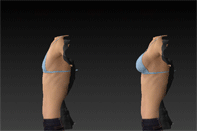It’s been said that the average person spends almost 2 hours per day on social media. From chatting with family members to posting pictures and sharing them with friends, social media is affecting people in ways we’re only just beginning to understand.
Social media is driving an increase in demand for plastic surgery. Many plastic surgeons are reporting that more and more people in their 20’s and 30’s are wanting work to be done than ever before. The prospective patients will come in with an Instagram photo of themselves where they feel that a certain aspect of their face is distorted, or they will bring in a picture of a celebrity whom they want to look more like.
Selfies and Self-Perception
A study was published in 2016 that found that people will often perceive themselves as more likeable and attractive than others do. These biases in self-perception can lead to a whole host of psychological issues which can ultimately manifest in lowered self-esteem or a trip to the plastic surgeon’s office to correct a perceived issue with their face or body.
The younger generations are being affected by this especially hard due to the prevalence of selfies and importance of social media in their peer groups. Psychologists state that most people view selfies as harmless “peacocking”, but there is a blurred line that exists that could lead to a downward cycle of self-doubt and misunderstanding.
For example, if someone is attempting to lose weight and they post a picture of themselves on Facebook and someone makes a negative comment or a joke, it can have a very strong and negative psychological impact. Especially if the person already suffers from low self-esteem and is using that Facebook post to seek affirmation for how hard they are working to lose that weight.
Social Media and Plastic Surgery Trends
Over the years the minimally invasive procedures such as Botox and fillers have gained a huge increase in popularity. This is due in part to how well they work, as well as the relative low cost as compared to getting a surgical cosmetic procedure done. People who are routinely active on social media view these procedures as a quick fix that can help them take better online pictures.
The American Association of Facial Plastics and Reconstructive Surgery (AAFPRS) sent out a survey to 753 board-certified plastic surgeons. The survey asked them to describe the trends they’re currently seeing in cosmetic surgery.
The AAFPRS members reported that the top two reasons people get cosmetic surgery are social media and the desire to look younger (and remain competitive) in the work place. 42% of plastic surgeons reported that their patients were seeking corrective work in order to look better in Instagram, Facebook, selfies, and other social media platforms. For those wanting cosmetic procedures due to work, the most popular procedure was making the eyelids look less tired.
A British think-tank called the Nuffield Council on Bioethics also released a report that found that Americans spent $13 billion dollars on plastic surgery in 2015 and that number increased to $16 billion in 2016. They concluded that social media is the number one driving factor in the increase in plastic surgery spending.
Social Media Downsides
Social media can be a breeding ground for negative comments about how people look. For example, Catherine Zeta Jones recently posted a picture of herself on Instagram. Over the course of a few days, she was hit with thousands of negative comments about her face. Most of the negative comments were accusing her of getting a botched plastic surgery procedure.
There is a stigma that some people have when it comes to plastic surgery. They feel that if you’re not born looking like a super model, then you shouldn’t get work done at all. This kind of rationale is absurd and can lead to lowered self-esteem issues – and in some cases, an increase in plastic surgery. If someone is ridiculed online for posting a photo of themselves, it could lead them to head back to the plastic surgeon’s office to correct whatever people are saying is wrong with them.
There is also an element of jealously involved. Considering how impersonal the internet can be, people will often be vicious towards complete strangers and all it takes is a keyboard and a quick click of the “Post” button.
There are many people out there on the social media sites that suffer from internal strife and they manifest it by taking their frustrations out on other people in the form of negative comments – by reacting negatively, and attempting to bring someone down to their level, these “haters” are seeking a form of self-fulfilling therapy.
Cosmetic Surgery in Dallas
There shouldn’t be any stigma when it comes to plastic surgery. After all, the intent of the person seeking work is to make themselves look and feel better. We don’t ridicule people when they exercise in an attempt to stay in shape, and the same line of reasoning should be applied to those who opt for plastic surgery. At the end of the day, it’s best to ignore the negative comments on social media by walking away and thinking to yourself: “Haters gonna hate.”
If you’re in the Dallas area and would like more information on plastic surgery or non-invasive procedures such as Botox and fillers, give our offices a call at (214) 965-9885 or schedule an appointment. Dr. Adams can help give you a new look and the confidence to post as many selfies on Instagram or Facebook as you can!

















